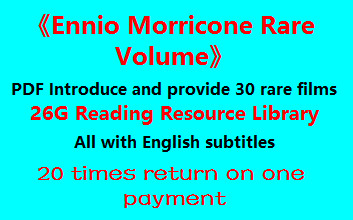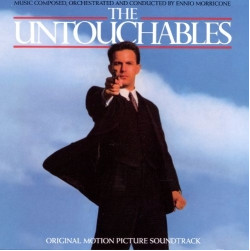THROWBACK THIRTY
Original Review by Jonathan Broxton
The colorful life of gangster Al Capone has captured the imagination of the American public for decades. He was the notorious crime boss of Chicago during the prohibition era in the late 1920s and early 1930s, and was beloved, despised, and feared in equal measure – many in Chicago’s working class neighborhoods saw him as a Robin Hood figure, helping the downtrodden of the city. Attitudes towards him changed in the aftermath of the brutal St. Valentine’s Day Massacre in 1929, after which law enforcement officials became more intent on bringing him to justice. Brian De Palma’s 1987 film The Untouchables tells a dramatic version of this largely true story, as dogged federal agent Elliot Ness forms a team of equally determined investigators in an attempt to end Capone’s criminal activity once and for all. The film starred Kevin Costner as Ness, Robert De Niro as Capone, and Sean Connery as Ness’s world-weary ex-cop partner Jimmy Malone, a role which won him an Academy Award for Best Supporting Actor.
The score for The Untouchables is by the Italian maestro Ennio Morricone, and was the first of the three collaborations between De Palma and Morricone, the others being Casualties of War in 1989 and Mission to Mars in 2000. Having received an Oscar nomination for The Mission the previous year, Morricone was at the height of his mainstream American studio popularity in 1987, enjoying one of the most fruitful periods even within his long and distinguished career, and The Untouchables is one of the most outstanding works to emerge from that period. Fully orchestral, overflowing with themes, powerful and passionate, and at times ridiculously audacious, The Untouchables can be seen as a distillation of what makes Morricone such an astonishing composer. His juxtaposition of aggressive, modernistic action and suspense music against gorgeous romantic writing, period-appropriate jazz, and rousing triumphalism is a masterpiece on every level.
The original 1987 soundtrack album, on A&M Records, is a superb piece of music, but is structured incredibly oddly, with no narrative flow, and seemingly random track placement, so instead of trying to make sense of it in terms of dramatic development, I’ll simply talk about the music and how wonderful it is. The opening cue is actually the last one, “The Untouchables (End Title),” a glorious piece of rousing, fully-orchestral Americana that builds and builds over the course of it’s three minutes, until the finale leaves you in raptures. The brass fanfares, the dancing strings, and the elegant woodwind accents are all magnificent; stylistically, parts of it remind me of the music he wrote for the 1999/2000 trio The Legend of 1900, Canone Inverso, and Mission to Mars, where the flamboyant pageantry is interspersed with the tiniest inflections of jazz from the flutes. It’s just glorious, and its reprises in the mid-album cues “Victorious” and “The Untouchables” are similarly crowd-pleasing.
Ironically, Morricone didn’t like these pieces at all; in a 2001 interview with Adam Sweeting of The Guardian he recalled that De Palma asked him to write “a triumphal piece for the police,” but that he was initially reluctant to do so. He went on to say that he “wrote nine different pieces in total,” but urged De Palma not to choose “the seventh, because it was the worst”. Of course, the seventh one is the one in the film and, on this occasion, I agree with De Palma’s taste over Morricone’s.
However, probably the most recognizable piece of music is “The Strength of the Righteous (Main Title),” an absolute showstopper which shows up as the eighth track on the album. Just from an orchestration point of view the cue should be a mess: solo harmonica, staccato piano, muted brass, strings, synths, and a modern rock/pop percussion section. Who writes music for that sort of ensemble? Well, Ennio Morricone does, and against all conventional wisdom it works like gangbusters, just like all his seemingly bizarre instrumental combinations have always done. The intense, unstoppable propulsive core speaks to the persistent doggedness of Ness and his cohorts, while the unpredictable rhythmic beats illustrates their willingness to bend the rules to get the job done. The harmonica, which Morricone has used brilliantly in dozens of scores dating back to his 1960s spaghetti westerns, has often been associated with loneliness and single-mindedness, and the same can be said here. Whether this is referring to Ness or Capone is left open to interpretation – it has often been said they were two sides of the same coin.
Speaking of Scarface, “Al Capone” himself has a theme, a purposefully old-fashioned melody that has hints of Scott Joplin ragtime in the pianos and classical Italianate phrasing in the brass; old world Europe meeting new world America. The wah-wah brasses and light pop beats that crop up in the second half are vintage Morricone, the sort of thing he would have written for a 1970s Euro-thriller. As a musical identity for one of the most feared crime bosses in American history, it shouldn’t work, but it absolutely does, the personification of self-aggrandizing swagger and bravado.
The beauty comes through two pieces of simple, gorgeous melodic writing. The first, the “Death Theme,” revisits some of the jazz ideas heard in Al Capone’s theme but makes them softer, smoother, and more intimate, with a beautiful saxophone line underpinned by a bed of elegant strings. The second, as heard in “Ness and His Family,” is a prototypical Morricone romance piece, a lush, long-lined, slightly bittersweet melody for strings and solo flute that recalls some of his best efforts of that type: Cinema Paradiso, La Tenda Rossa, La Califfa.
The action, tension, and suspense music, in cues like “Waiting at the Border” and “The Man With the Matches,” is dark and intense, with frantic woodwind figures joining the stark bass guitar pulses, the piano chords, the harmonica tones, and the percussion hits that reference the Strength of the Righteous theme. “On the Rooftops,” which underscores the film’s central action sequence, is another variation on the Strength of the Righteous theme, taking the same orchestrations, same melody, and same rhythmic core, but expanding it out with some avant-garde string writing which shifts around between violins, violas, and cellos, to illustrate the danger that Ness, Malone, and the other Untouchables face. “False Alarm” is a brief, intense piece of string and woodwind dissonance, while in the “Machine Gun Lullaby” piece that closes the album, Morricone blends many of these same ideas with a child-like music box melody – again, a creative choice that sounds ridiculous, but which somehow creates an unnerving mood through the juxtaposition between innocent beauty and stark suspense.
Morricone received his second Academy Award nomination in two years for The Untouchables, but ultimately lost the award to Ryuichi Sakamoto, David Byrne, and Cong Su’s all conquering score for The Last Emperor. However, the score did win both a BAFTA and a Grammy Award, and over time the score has come to be rightly regarded as one of the best, and most important, works Morricone ever wrote for an American film.
In 2012, to recognize the 25th anniversary of the film, La-La Land Records and producers Dan Goldwasser and Neil S. Bulk released a special 2-CD set of the score for The Untouchables. The first disc contains the complete score as heard in the film, expanded to 55 minutes, re-mastered, and re-sequenced to make more dramatic sense, with the iconic main title at the beginning, and the celebratory end title at the end. The second disc contains a re-mastered version of the original A&M soundtrack, along with a number of bonus tracks and source music pieces, including a song demo – “Love Theme from The Untouchables” – performed by none other than Randy Edelman. The La-La Land album, which was limited to 3,500 copies, has been out of print for some time, but the original A&M album is still very much available; whether you go for the more concise version, or whether you are able to track down the more luxurious deluxe edition, The Untouchables is an essential purchase for anyone who wants to understand what makes Ennio Morricone a genius.
Buy the Untouchables soundtrack from the Movie Music UK Store
Track Listing:
- ORIGINAL 1987 A&M RELEASE
- The Untouchables (End Title) (3:10)
- Al Capone (2:55)
- Waiting at the Border (3:46)
- Death Theme (2:41)
- On the Rooftops (2:33)
- Victorious (2:09)
- The Man With the Matches (2:46)
- The Strength of the Righteous (Main Title) (2:26)
- Ness and His Family (2:45)
- False Alarm (1:12)
- The Untouchables (3:04)
- Four Friends (2:51)
- Machine Gun Lullaby (7:02)
- EXPANDED 2012 LA-LA LAND RELEASE
- The Strength of the Righteous (2:31)
- Ness and His Family, Part I (1:40)
- Warehouse/False Alarm (1:51)
- Ness Meets Malone (1:21)
- Al Capone, Part II (Version 2) (1:39)
- A Mother’s Plea (0:55)
- Ness Meets Wallace/Ness Meets Stone (0:33)
- Victorious (2:10)
- Murderous/Goodnights (1:40)
- Nitti Harasses Ness (1:01)
- Send Family Away (1:00)
- Waiting for What?/Montana Intro (0:48)
- Waiting at the Border (3:47)
- The Untouchables (3:05)
- Surprise Attack/Dead Man’s Bluff (1:15)
- Ness and His Family, Part II (1:17)
- In the Elevator (1:10)
- Four Friends (2:51)
- Payne and Bowtie/Ness Study/Al Capone, Part I (0:52)
- The Man with the Matches/Nitti Shoots Malone (3:04)
- Malone’s Death (2:17)
- Machine Gun Lullaby/Kill Bowtie (7:41)
- Courthouse Chase (1:38)
- On the Rooftops/Nitti’s Fall (2:55)
- He’s in the Car/Here Endeth the Lesson (0:32)
- Death Theme (2:42)
- The Untouchables (End Title) (3:10)
- The Untouchables (End Title) – Original A&M Album (3:11) – BONUS
- Al Capone – Original A&M Album (2:56) – BONUS
- Waiting at the Border – Original A&M Album (3:46) – BONUS
- Death Theme – Original A&M Album (2:42) – BONUS
- On the Rooftops – Original A&M Album (2:34) – BONUS
- Victorious – Original A&M Album (2:09) – BONUS
- The Man With the Matches – Original A&M Album (2:47) – BONUS
- The Strength of the Righteous (Main Title) – Original A&M Album (2:28) – BONUS
- Ness and His Family – Original A&M Album (2:45) – BONUS
- False Alarm – Original A&M Album (1:12) – BONUS
- The Untouchables – Original A&M Album (3:04) – BONUS
- Four Friends – Original A&M Album (2:50) – BONUS
- Machine Gun Lullaby – Original A&M Album (7:08) – BONUS
- Mood Indigo (written by Duke Ellingon, Irving Mills, and Barney Bigard, arranged by Bob Wilber) (3:41) – BONUS
- Al Capone, Part II (Version 1) (1:39) – BONUS
- Machine Gun Lullaby (no celeste) (4:58) – BONUS
- On the Rooftops (no saxophone) (2:34) – BONUS
- Here Endeth the Lesson (Alternate) (0:16) – BONUS
- Love Theme from The Untouchables (performed by Randy Edelman) (4:07) – BONUS
Running Time: 39 minutes 20 seconds (A&M)
Running Time: 113 minutes 12 seconds (La-La Land)
A&M Records 393-909-2 (1987)
La-La Land LLLCD-1236 (1987/2012)
Music composed and conducted by Ennio Morricone. Orchestrations by Ennio Morricone. Recorded and mixed by Greg Fulginiti. Edited by Thomas Drescher. Score produced by Ennio Morricone. 2012 La-La Land album produced by Dan Goldwasser and Neil S. Bulk.












